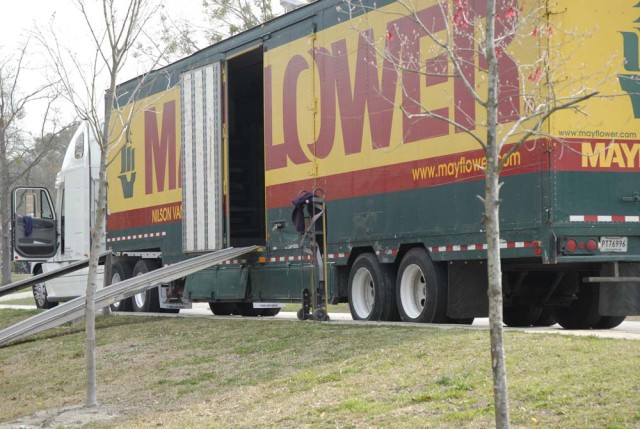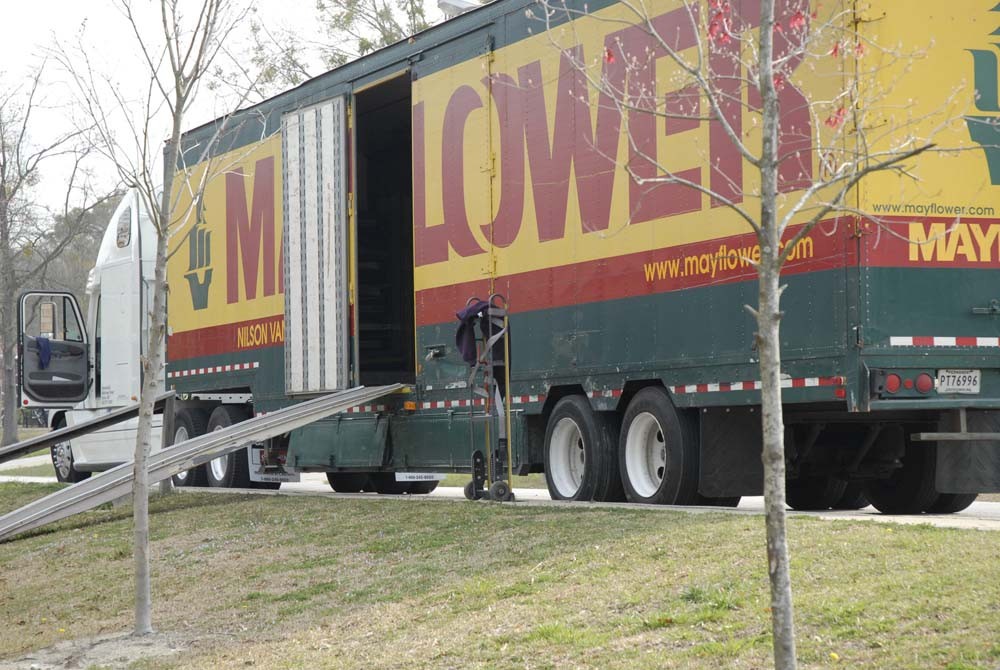FORT JACKSON, S.C. (Army News Service, March 15, 2007) - "Home is where the Army sends you" is a familiar phrase among Army families. A permanent change of station can be tough for many reasons, but PCSing with children produces many other challenges.
A PCS can mean leaving behind friends, familiarity and sometimes even members of the family. To make things easier on children, experts recommend planning ahead as much as possible to ease the transition from the current duty station to the new home.
"We try to remind people that when PCSing, it is important to keep their kids involved," said Tom Askey, Army Community Service Relocation and Readiness Program manager at Fort Jackson. "Don't just make them sit and watch TV in the other room while you take care of everything. It is important that they feel they are a part of everything."
Communication is key to making a PCS with children go smoothly, Askey said. He suggests explaining why, where and when the move will take place. Answer all questions children ask, and encourage them to ask more as questions as they arise. Things you may not think are important, he said, may be very important to children.
While military families normally can't choose where their next duty station will be, they can choose whether they want to live on post or find a neighborhood off post. Children can help make these decisions and others like how they want to decorate their new bedroom or even which toys and games they would like to keep handy for the actual trip to the new duty station.
Askey suggests helping children learn about their new home before moving by looking at maps, newspapers or pictures of the new area. The Department of Defense Standard Installation Topic Exchange Service Web site, at <a href="http://www.dmdc.osd.mil"target=_blank>www.dmdc.osd.mil</a>, offers information on installations worldwide, as well as the local area surrounding each installation.
One of the most important things parents can do to help the transition for their children is to talk to the school liaison officer at either their current or next duty station, said Ruth Russell, Fort Jackson's SLO.
"I've had people that I've never even met e-mail me and then I just get as much information as I can, and I e-mail that all to them," Russell said. "It makes it quicker; they've got the information in hand."
A school liaison officer is the garrison commander's representative on education issues. They normally facilitate mediation between schools, parents and the command group, as well as forge partnerships with the local school system. They are not school employees or officials.
While Russell doesn't offer specific recommendations on which schools students should attend, she and other SLOs can direct parents to the information they need to determine which school is the best fit for their family. She recommends checking out the SLO's Web site at the new installation.
Russell recommends that parents check out school districts before choosing a home, because in many locations the school a child attends is determined by their address. It's also helpful check prospective school's start and end dates, and graduation requirements for high-school age children.
"Each state has different requirements and that's the tricky thing," Russell said. "Some states require a certain number of credits per year to be a junior or senior. But, South Carolina and many other states require specific classes. So we always recommend taking the most rigorous courses that you can when you are starting high school if you are a military kid."
Take a photocopy of the title page and table of contents pages of your child's current textbooks. That way, the new school and teacher can see exactly what your child has been learning and better match your child with the new curriculum, making an easier transition.
Also, Russell recommends hand-carrying a photocopy of school records. Schools will send official records to each other, but it is best to have a photocopy with you the day you arrive. She also recommends bringing contact information for the previous school so the new school can easily get more information. Some high schools also ask for a letter of discipline for new students, which can outline any trouble the student has gotten into, or if the student hasn't gotten into any trouble, the letter should state that as well.
Russell partners with the Exceptional Family Member Program as well as the local schools in the area.
"It's really helpful to partner with all these other organizations, because it's easy to call them up and say 'what can we do to help this particular student who needs this particular service''" she said.
For families with a child in the EFMP, Russell said it is vital to keep the Individual Education Plan up-to-date. It is a federal law for a school to abide by an IEP but only if it is current.
"I love it when someone calls me and says 'I'm coming to Fort Jackson in two months,' because then what I do is find out what ages their children are and what interests they have, and I'll send them packets in the mail of everything - these are the neat clubs on post and these are our activities," she said.
The Military Child Education Coalition has set up a new Web site, <a href="http://www.schoolquest.org"target=_blank> www.schoolquest.org</a>, a secure online service for helping locate new schools when families receive orders. Users answer a few questions about their family and school-aged children, and the quest process pulls up school information for the military community they are moving to that match the needs of their family.
(Kristen Marquez writes for the Fort Jackson "Leader.")


Social Sharing